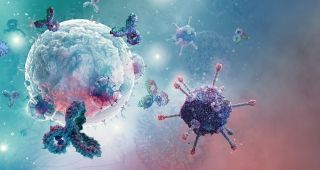Stress
How Our Immune System Determines Our Real Age
The immune system is a biological clock more precise than our numerical age.
Posted September 29, 2023 Reviewed by Tyler Woods
Key points
- Aging of the immune system is the main factor in the aging of the whole organism.
- Some metabolic and mental diseases accelerate the aging of the immune system.
- Aged immune cells cannot eliminate other aged cells.

Covid-19 taught us valuable lessons. One was the finding of a difference in immune system responses to virus infection among patients. People with certain underlying medical conditions are at a higher risk for severe COVID-19 outcomes, such as hospitalization, admission to the intensive care unit (ICU), intubation or mechanical ventilation, or death. In addition to aging, the main underlying diseases include cancer, chronic kidney disease, chronic obstructive pulmonary disease (COPD), heart conditions, immunocompromised state, obesity, pregnancy, and type 2 diabetes. This vulnerability is associated with a reduced immune response to SARS-CoV-2, particularly in elderly individuals, which results in severe inflammation. In most comorbidities that exacerbate COVID-19 outcomes, the insufficiency of immune system response is the main culprit [1].
Senescence and immunosenescence
The destiny of all cells in the body is a cellular state called senescence, characterized by a lack of division capacity. In senescence, cells become enlarged, flattened, and adopt a secretory phenotype, releasing factors that notify the immune system to remove them. Neighbors or immune cells remove these cells through the induction of death or phagocytosis, another way to destroy a cell. This cellular phenomenon occurs at all stages of life; however, it accelerates in older individuals. Cellular senescence is induced by cellular stresses such as DNA damage, cancer-associated genes activation, oxidative stress, and mitochondrial dysfunction. Therefore, senescence prevents the cellular reproduction of damaged cells and cancer occurrence. However, the accumulation of senescent cells in older people results in aging, typically manifesting as frailty, muscle atrophy, cognitive decline, cardiovascular disease, and metabolic dysfunction.

The immune system can be considered a biological clock for analyzing biological age
Senescent cells are primarily inflamed cells. Inflammation is one of the factors that can induce senescence on its own, in fact. Moreover, the accumulation of senescent cells spreads senescence to other tissues. Senescent cells are often referred to as "zombie cells." If the immune system is unable to eliminate them, zombie cells will continuously transform normal cells into new zombie cells. They also attack immune cells that are responsible for removing them. Immunosenescence can be both a cause and a consequence of the accumulation of senescent cells in the elderly or in people with other pathological conditions, such as obesity and type 2 diabetes.
Therefore, it is plausible to assume that the level of senescence in immune cells determines the true aging of one's body, separate from chronological age. Based on this paradigm, younger individuals may exhibit characteristics typically associated with aging, or conversely, older individuals may display characteristics typically associated with youth despite their chronological age. Even before reaching midlife, individuals who experienced accelerated cellular aging showed lower physical abilities, cognitive decline, and brain aging. They also reported poorer health and appeared older in terms of their physical appearance [2]. Therefore, the immune system acts as a biological clock, determining a biological age that may differ from chronological age.
Several factors influence immunosenescence, especially in T-cells, such as viral infections, including cytomegalovirus and HIV. Other factors that induce low-grade inflammation are chronic stress, obesity, sleep loss, and gut microbiome imbalance [3]. These factors, then, may influence aging acceleration, directly and indirectly, through inflammation-induced immunosenescence. This is another way in which the immune system determines biological age apart from chronological age.
Psychological factors may also accelerate immunosenescence and aging
Among the factors that influence the senescence of immune cells, mental stress should be mentioned. Psychological stress can dysregulate the human immune system and chronic stress can activate the hypothalamus-pituitary-adrenal (HPA) axis and lead to higher-than-normal cortisol production, which can impair immune function.
Chronic stress is associated with the accelerated aging of the immune system and is a significant risk factor for the development and progression of various physical and mental disorders. The telomere, which is located at the end of a chromosome, has emerged as a highly promising mechanism for understanding the molecular pathways and mechanisms that connect stress and cellular aging. Several studies have linked the length of telomeres in immune cells with stress-related conditions and states, as well as various physical and mental disorders [4].
Taken together, the recent studies have shown that senescent cells, like zombies, corrupt other cells, particularly immune cells, through various inflammatory factors. The removal of these cells is impaired by the induction of senescence in immune cells, which worsens the accumulation of senescent cells in other tissues. The extent of senescence in immune cells determines aging processes and biological age.
References
1. Bigdelou, B., Sepand, M. R., Najafikhoshnoo, S., Negrete, J. A. T., Sharaf, M., Ho, J. Q., . . . Zanganeh, S. (2022). COVID-19 and Preexisting Comorbidities: Risks, Synergies, and Clinical Outcomes. Front Immunol, 13, 890517. doi:10.3389/fimmu.2022.890517
2. Xu, W., Wong, G., Hwang, Y. Y., & Larbi, A. (2020). The untwining of immunosenescence and aging. Semin Immunopathol, 42(5), 559-572. doi:10.1007/s00281-020-00824-x
3. Belsky, D. W., Caspi, A., Houts, R., Cohen, H. J., Corcoran, D. L., Danese, A., . . . Moffitt, T. E. (2015). Quantification of biological aging in young adults. Proc Natl Acad Sci U S A, 112(30), E4104-4110. doi:10.1073/pnas.1506264112
4. de Punder, K., Heim, C., Wadhwa, P. D., & Entringer, S. (2019). Stress and immunosenescence: The role of telomerase. Psychoneuroendocrinology, 101, 87-100. doi:10.1016/j.psyneuen.2018.10.019


